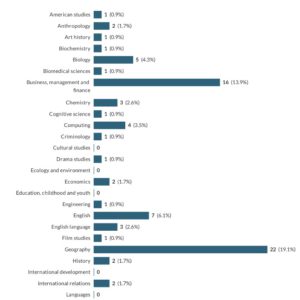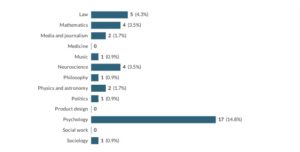- Following in tradition from the previous sage scholars, in early December 2016 we formulated a survey for undergraduate students in order to find out about their pre-arrival preparation for university, particularly in their reading allocations. Having received 115 responses in total, the largest proportion of students came from Geography students at 19%, followed by Psychology students at 14%, and Business Management and Finance at 13%, with the rest of the results being supplied by students from a variety of other subjects. In the following 3 posts we will look at how students approached their reading materials, this first post will look into the choices made about books from students who received a pre-arrival reading list.
When asked if a pre arrival reading list was received before beginning the course, only 36.5% of students answered yes, however 64% of students who received their reading lists did actually utilise them (so well done you).
We wanted to know how these students decided which books they were going were going to purchase from the lists, and the result was quite mixed. 34% of students bought their books in accordance to the relevance to the course, where 28% of students simply bought all of the recommended reading from the lists they received, the remaining 38% opted for the more economical route to choosing books to buy, via methods such as purchasing what was available second hand, what wasn’t available in the library, and what were the least expensive.

For the 36% of students who didn’t use the reading list to purchase any books, the majority of their responses at 27% stated that they didn’t want to commit to purchasing books before the course began, suggesting there are reservations in making an investment into books that may not be completely essential. This ties in with the fact that 20% of our responses concluded that the books being TOO EXPENSIVE was the deciding factor in their utilisation of the pre-arrival reading list. Many other students indicated they’d resisted form purchasing books prior to starting the course as they thought they potentially could access them elsewhere e.g. the library, online and previous students.



